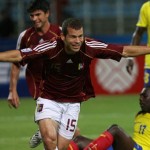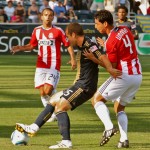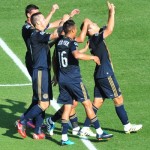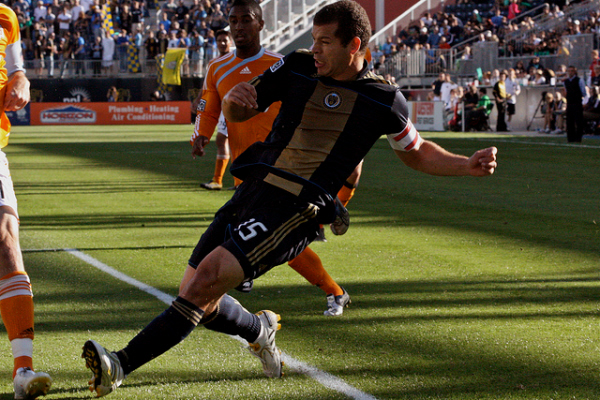When Alejandro Moreno was taken in the expansion draft, he was expected to be a vocal, influential presence on a young Philadelphia Union team. The Columbus Examiner described him this way: “Moreno brought championship pedigree to a team with almost no playoff experience, having won MLS Cup with two different clubs before leading the Crew in scoring en route to the 2008 championship.”
 But Moreno brought more than a history of MLS success to Philadelphia. He is a regular for the Venezuelan national team and exhibits a rare combination of leadership and humility. When asked last week by PSP what role he played in the locker room this season, Moreno said, “It was clear I would bring my experiences in MLS and on the national team.”
But Moreno brought more than a history of MLS success to Philadelphia. He is a regular for the Venezuelan national team and exhibits a rare combination of leadership and humility. When asked last week by PSP what role he played in the locker room this season, Moreno said, “It was clear I would bring my experiences in MLS and on the national team.”
Moreno explains with clarity and precision how each game, while individual, is part of a larger whole. Games that were lost this year may be won next season if the team can master one difficult skill. “We need consistency,” Moreno said, “We need performances that turn losses into ties and ties into wins. There will be games where the ball doesn’t want to go in, but you scratch out a win. Next season we need to come in with an attitude that we understand things are clicking for us. We didn’t allow ourselves that arrogance this year.”
From the outset, the Venezuelan forward was clearly going to be a uniquely important player for the Union. He was the only pure striker on the roster after the expansion draft and, although the Union would go on to select Danny Mwanga first overall in the SuperDraft, Moreno was the only proven goal-scorer on the Philly roster. Remember: Sebastian Le Toux had fewer shots on goal in 2009 (12) than he had goals in 2010 (14).
2010 Statistics
26 games played. 25 starts. 2 goals. 7 assists. 18 shots. 8 shots on goal. 1 caution.
Moreno on his numbers: “Two goals for me is simply not good enough.”
To better understand the stats, it’s instructive to listen to John Hackworth on the KYW/PSP podcast. Hackworth describes the Union’s formation as a 4-2-2-2 with wingers who drifted inside, almost forming a box of midfielders behind an attacking duo comprised of some combination of Mwanga, Moreno and Le Toux. The obvious question mark in this system is the outlet player.

When Le Toux couldn’t find space over the top, the Union were prone to getting packed into their small midfield triangles, unable to create scoring opportunities. Although he has always been a threat in the box, Moreno took it upon himself to move further from goal and act as a holding striker and distributor. “The team on the field forced me to be more of a hold up player, a provider,” Moreno said. “Sebastian’s speed and Danny’s presence in the box meant I had to step back and distribute, but my movement was good.”
High point
Returning to the Hackworth interview, the Union assistant coach scientifically describes the colloquial “good form” when he examines the relationship between Le Toux’s growing confidence and his improved touch. For a striker, this is all part of an easy-to-follow formula: Good runs become good opportunities. Good opportunities become goals. Goals beget confidence. Confidence begets good touch, which produces MVP-caliber form.
Now let’s return to step one: Good runs become good opportunities. How? Good support play.
When asked what questions he had coming into the year, Moreno responded, “There was never any question that we were going to work for each other on this team.”
Fittingly, the high point of Moreno’s season was his fantastic pass to set up Le Toux’s second goal of the season against DC United. Facing away from goal and a defender scrubbing his back along the left touch line, Moreno turned and curled a crossfield pass over the defense to a streaking Le Toux, who made no mistake with the finish. Good support play indeed; there’s a shot of confidence for you, Seba.
Low point
The low point of the season for Moreno could have been the first goal of Danny Mwanga’s career. Who needs an aging striker when you can play two of the most exciting players in MLS up top? But although Peter Nowak stuck with Moreno, the veteran didn’t find the back of the net until August. As the Union continued to drop points, fans wondered when the Venezuelan would find his goal-scoring touch.
Strengths
While he was able to adjust his playing style to suit the team, Moreno’s greatest strength is his ability to communicate with the younger players. It is simple to tell a teenager what he needs to do better, but it is extremely difficult to tell him how to do it, to break it down into steps the player can follow. Moreno has this rare gift. It’s a gift good coaches have, and it’s a gift that allows some players to extend their career while others are unable to adjust to their changing role and skill set.
When the Union’s young contingent blossoms into the stars of tomorrow, there’s no doubt they will remember Alejandro Moreno. He understands that in order for Philadelphia to become a playoff contender, it’s the youngest players who have to make the biggest strides. “There is value to natural ability that you can’t teach. We all know Danny has the natural ability, and his attitude and commitment can improve. And this is something I’ve said to him. And Jack [McInerney], he wants to score goals. He has those instincts. He just has to learn when to hold the ball up.”
Weaknesses
For a big fellow, Moreno has a tendency to go down rather easily at times and often in suspiciously dangerous positions for free kicks. If he didn’t get the call, fans rolled their eyes and compared him to Drogba. When the whistle did blow, it was easy to look the other way and hope that Nakazawa was on the pitch.
Moreno’s other weakness was out of his control. How does an over-30 forward who has made his living in the box partner with a speedster like Le Toux? Too often the Frenchman found himself with nobody in the middle after tracking down a ball in the corner or beating his man up the wing.
Outlook
 Although Alejandro Moreno had trouble scoring goals and plays the same position as the Union’s most exciting players, it will be disappointing if he’s not on the team next season. When asked about his expectations coming into this season, Moreno responded with the plural “we, ” and that’s significant. “We wanted to put a competitive product on the field,” Moreno said, “and wanted to know, can we lay a foundation for success?”
Although Alejandro Moreno had trouble scoring goals and plays the same position as the Union’s most exciting players, it will be disappointing if he’s not on the team next season. When asked about his expectations coming into this season, Moreno responded with the plural “we, ” and that’s significant. “We wanted to put a competitive product on the field,” Moreno said, “and wanted to know, can we lay a foundation for success?”
There will be plenty of playing time up for grabs next year. Both the young players who get that time and those who don’t will need a player like Moreno around to teach them how to handle success and adversity.
His value as a mentor and a leader cannot be questioned, but it’s unclear what Moreno’s on-field role will be going forward. Can he count on another 2,000 minutes of playing time? With Le Toux in the crosshairs of every defense in the league, Philadelphia will need a big increase in production from the rest of their strikers. Moreno can still be effective, but if the Union persist with their fast-paced, high movement style he may be more useful as a substitute than as a 60-90 minute player. That said, there isn’t anybody else on the team who can play the holding striker role with nearly the intelligence of Moreno, and he may be the perfect starting striker for tough away matches.
Moreno can be frustrating to watch, especially on a Union squad that seems built around pace. But on a young team that lacked consistency and struggled with mental toughness, he may be indispensable.


Excellent review of Moreno’s season and his impact on and of the field. I was one of many who questioned his effectiveness as a striker. After listening to the KYW/PSP podcast with him several weeks ago I saw Moreno in a new light. So much of what we see on the pitch occurs because of what happens in practice and in the locker room and I have no doubt that Moreno is one of the too easily overlooked leaders on the squad. I truly hope he is with the team in 2011 and I look forward to his coaching career when he retires from playing the game. He’d be a natural.